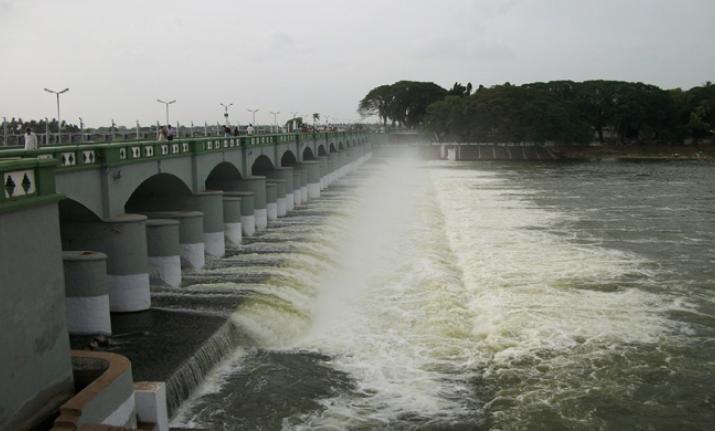
Karnataka desperate to build Mekedatu dam, TN firmly opposes project
Karnataka Chief Minister B S Yediyurappa on Friday requested the Centre to provide early clearances to Mekedatu dam, proposed to be built across Cauvery river, for providing drinking water supply to Bangalore (4.75 TMC) and generate about 400 MW of power for the state. However, neighboring Tamil Nadu is strongly opposed to the project fearing backlash from its own farmers.

Karnataka Chief Minister B S Yediyurappa on Friday requested the Centre to provide early clearances to Mekedatu dam, proposed to be built across Cauvery river, for providing drinking water supply to Bangalore (4.75 TMC) and generate about 400 MW of power for the state. However, neighboring Tamil Nadu is strongly opposed to the project fearing backlash from its own farmers.
Yediyurappa, who was in Delhi on Friday, met Union Minister for Environment and Forests Prakash Javadekar and requested him to direct his officials to grant the Terms of Reference for Mekedatu project.
The development comes amid heated discussions on the topic in the Tamil Nadu Assembly earlier this week. Tamil Nadu Chief Minister Edappadi K Palaniswami on September 15 asserted in the State Legislative Assembly that the state would not allow Karnataka to construct the dam at Mekedatu under any circumstances. It involves construction of a dam with a storage capacity of about 67.16 tmcft of water.
The opposition DMK even urged Palaniswami to take a delegation of leaders, including leaders from Opposition parties, to the Prime Minister and apprise him of Tamil Nadu’s stand over the issue.
The possibility of generating power from Mekedatu has been under examination since 1948, when Kollegal territory was a part of the Madras Presidency. However, it wasn’t taken up till the reorganization of the states in 1956. The issue heated up after Karnataka Power Corporation Limited (KPCL) prepared a report in July 1996 in favour of the project. Ever since the project mired in inter-state dispute.
With the TN state elections approaching, experts are of the opinion that the Centre may not give permission to the project any time soon.
Related news: Yediyurappa writes to PM Modi to clear Mekedatu project
Tamil Nadu’s argument is that the project is Karnataka’s “ploy” to secure greater storage of Cauvery water. Karnataka, however, has repeatedly told Tamil Nadu that the total quantum of water to be made available to Tamil Nadu at Biligundlu in a normal year (177.25 TMC) annually, as accorded by the Supreme Court in February 2018, will be met.
Karnataka argues that the project meets the demands of providing drinking water facilities to the areas deprived of drinking water in Bangalore Metropolitan area, benefitting about 100 lakh people with 135 lpcd (litres per capita daily). Besides it views that harnessing 400 MW of hydro power is an additional benefit utilizing the fall in the natural bed of the Cauvery River.
Environmental concerns
The project, estimated to cost Rs 9,000 crore, was approved by the Karnataka government in 2017 and received approval from the Union Water Resources Ministry. However, it awaits approval from the Ministry of Environment and Forests (MOEF). Besides, Tamil Nadu has challenged it in the Supreme Court.
The project requires a total of 5252.40 Ha of land for the construction of project components and submergence of forest, wildlife and revenue land. It includes 2925.4 hectare of land of Cauvery Wildlife Sanctuary and 1869.5 hectares of forest land, and about 201 acres of land within the villages of Sangama, Kongedoddi, Madavala, Muthathi and Bommasandra and additional 256.4 acres of public land for tunnels, approach road and others.
Related news: Godavari-Cauvery river linking: Tamil Nadu’s pipedreams and ground realities
Environmentalists have strongly opposed the move as the sanctuary is the only habit for a number of wildlife species that are endangered. The pre-feasibility project report by the Cauvery Neeravari Nigam Limited in 2019 notes that the river flowing at the middle of the Wildlife Sanctuary remains home for the endangered and endemic fish species like called Deccan Mahsheera, a freshwater fish, smooth-coated and small clawed otter, marsh crocodile, soft shelled turtle and endangered Indian Pangolin, near threatened Kollegal ground gecko, critically endangered white-rumped vulture among other species.
Considering that the wildlife sanctuary is also connected to Biligiri Ranganathaswamy Temple Tiger Reserve through Male Mahadeshwara Wildlife Sanctuary, environmentalists believe the project will also cut off access to elephants and tigers in the region and would further escalate the human-animal conflict.


